Fleas could be really annoying and drive us crazy. When you find one flea, there might be 1000 more in your house, especially in the summertime. If left uncontrolled, not only your dogs can get hurt, you can also get bitten.
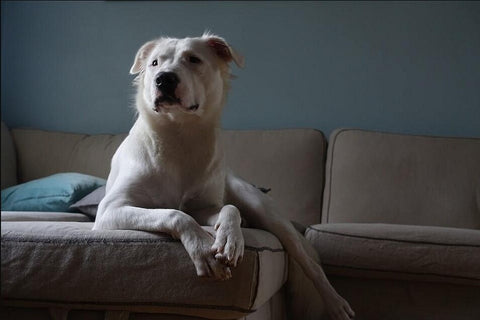
They are many ways you can use to get rid of fleas. The best way is to prevent them from coming out from the beginning. When this is really happening, you can also choose a medicinal solution or resort to homemade means. A combination of several ways can be better.
Please remember to contact your vet before using medication. A wrong product can cause side effects to your pet. Here are several tips from Happy & Polly for you to refer to.
How to Prevent Flea?
- Flea collars
Flea and tick collars have 2 kinds of functions: repelling and treating. One type of dog collar can release gas to repel fleas. This type can be used before your dog gets fleas as preventative flea treatment.
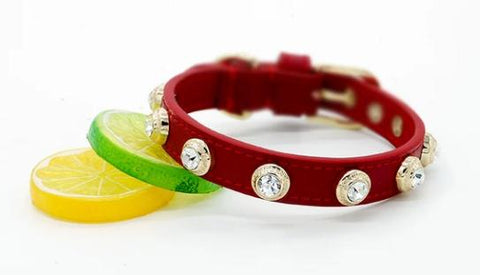
The other one can release drugs into the fat layer of the dog’s skin and kill fleas and ticks. Some collars can repel and treat at the same time. You should read instructions before using them on your pet.
Flea collars also have disadvantages. It may be effective in some parts of your puppy because it is worn on the neck. And another one is that some collars may contain drugs that are harmful to your pet. You should always consult your vet or do some research before using flea collars.
- Homemade Flea Collars
For those who want to avoid the possible side effects of chemicals and purchased collars, you can make homemade flea collars and use more natural ingredients to prevent fleas.
These are usually made of essential oils and handkerchiefs. Dip the turban in the mixture and place it on the dog’s neck.

Some recommended essential oils are lavender, rosemary, thyme, and cedar. Garlic oil may also be effective. Before using oils to treat dogs, be sure to discuss with your veterinarian.
The disadvantage of these collars is that they do not last as long as purchased collars, and they are more effective around the head and neck, while other parts of the body are more susceptible to infestation, but they do not contain potentially harmful chemicals.
- Homemade Flea bag
This small bag of things smells good, but it took the pests away from your pet. You will need...
- Two 6-inch square breathable fabrics
- A small number of cedar flakes
- 1-2 teaspoons of dried lavender buds
- 1 lemon zest
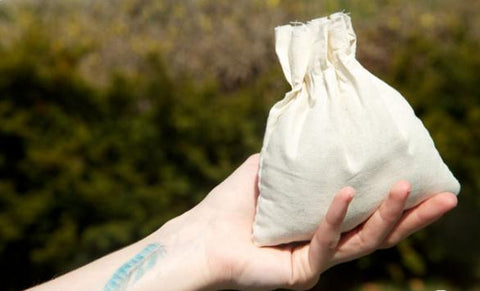
Cut 2 pieces of 6-inch square fabric and put them together from the inside to the outside. Sew everything except one side, and then turn it inside out. Fill with a small number of cedar flakes, 1-2 teaspoons of lavender, and 1 lemon zest. Leave enough space at the top so that it can be tied or sewn with ribbons. Place it under or near the pet bed/bedding to prevent fleas. Change the mixture every month or so.
How To Get Rid of Flea?
- Flea Bath
Wash the puppy once a week to prevent fleas. You will need...
- 1/2 cup freshly squeezed lemon juice
- 1½– 2 cups of freshwater
- 1/4 –1/2 cup of mild shampoo
Stir half a cup of lemon juice, 1.5 cups of water, and 1/4 cup of mild shampoo. Wash bottles, label, and bathe weekly to prevent fleas. The amount depends on the size of your dog. As a general rule of thumb, use 2 parts water for every ½ cup of soap and lemon juice.
- Flea comb
If you already have a store-bought flea comb, then this is one of our recommended methods to deal with fleas, and no additional purchase is required.
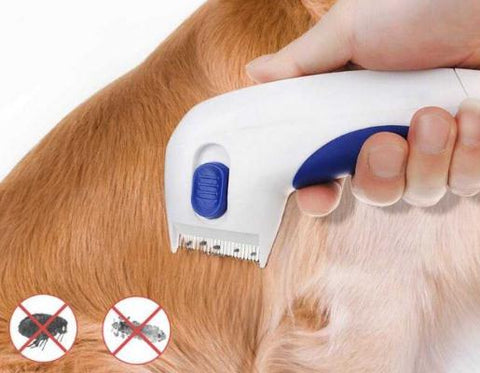
Flea combs do not contain any chemicals but are specially designed to remove fleas and their eggs from the dog’s fur. If your dog is already infested with fleas, this is a good way to get rid of existing fleas.
- Flea and Tick Medication
There are several drugs and medicines that can prevent fleas in dogs. You may be familiar with the topical treatment you get from a vet, and then apply it to the dog's back to reduce the burden every month. Although some dog owners worry about the potential side effects, they are usually effective.
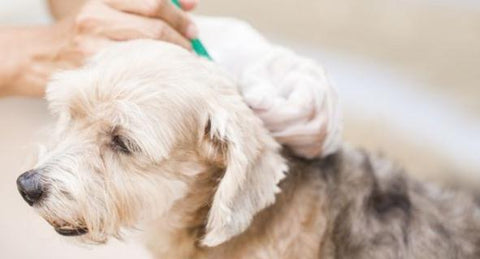
You should research all these options and discuss them with your vet before giving them to your dog. Although they are effective in treating fleas, they can also cause side effects in your uncomfortable dog. Please consider all options before making a decision.
How to Prevent Fleas Coming Back?
- Clean dog’s bed and supplies
One of the easiest ways to prevent fleas is to keep the indoor environment clean, especially where your dog likes to go and the things they interact with frequently.
For example, their bedding should be cleaned frequently and thoroughly. Any furniture or pillows they want to sleep on, the carpet or carpet they want to lie on, or any toys and stuffed toys they want to play with should also be cleaned frequently.
Vacuuming and washing fabrics regularly will help prevent fleas from living in your home.
- Clean your house yard
Just because you can't see them doesn't mean they don't exist. If your dog suffers from fleas, it is also likely to be lurking in the darkest and wettest area of your backyard. For outdoor flea therapy, natural remedies are always the best method. This is our important secret for treating fleas in the backyard.

Fleas like to hide, so you should trim or remove overgrown bushes and hedges and let your garden weeds free. Fleas thrive in damp, dark places, and they will avoid the sun as much as possible. Check the garden through the eyes of the flea and ask yourself where it is most likely to hide. With this in mind, please remove branches, dead leaves and excess mulch from under the bushes. Let as much sunlight enter your backyard as possible and avoid excessive watering.
An excellent way to treat fleas naturally is to grow certain plants that naturally repel fleas. Spearmint, chrysanthemum, and lavender are natural flea and insect repellents in your garden, as well as many other insect repellents. Before heading to your local plant nursery, you may need to do some research to find out which plants grow well in your area.
Hope this can help you protect you and your pet. If you enjoyed it and would like to see more news, do not hesitate to visit Happy & Polly website on https://happyandpolly.com.

